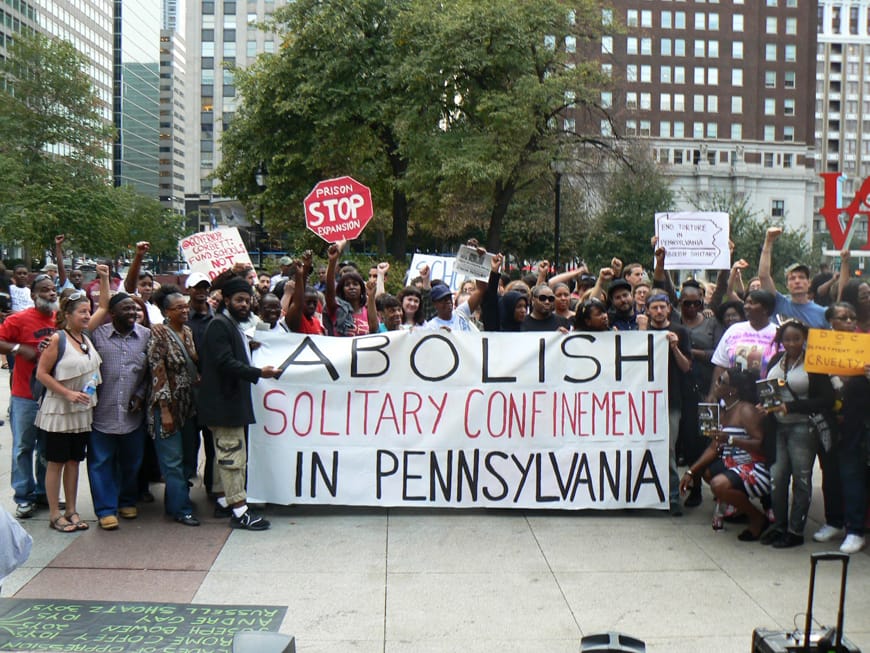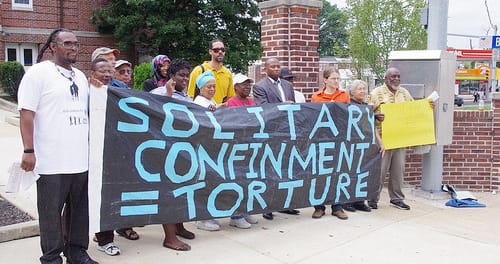by Shandre Delaney
Pennsylvania actions in commemoration of the one-year anniversary of the largest prisoner hunger strike in history
Prison family members – particularly mothers, daughters, partners, wives – formerly incarcerated persons, opponents of solitary confinement and mass incarceration and others in Pennsylvania will be fasting and making calls to Gov. Corbett and Department of Corrections Secretary Wetzel on July 8 to join the California Families Against Solitary Confinement and supporters around the country and the world in commemorating the one-year anniversary of the California prison hunger strike.

On July 8, 2013, 30,000 prisoners across California began their third hunger strike – the largest in U.S. history and the largest and longest in California prison history – to improve their own conditions and as an “act of solidarity with oppressed people around the world.” As a result, they have won: close to 500 prisoners now a step closer to being released and over 100 released from solitary, contact visits with loved ones and more, but solitary confinement continues. They have issued a three point action plan (see below). For more information, contact California Families Against Solitary Confinement (CFASC) at www.abolishsolitary.com or (714) 290-9077.
In Pennsylvania, we are also highlighting:
- The Dallas 6, prisoners who exposed torture at SCI Dallas prison in Pennsylvania and are facing brutal retaliation. Sign this petition to support them.
- The Coal Township prisoners – over 1,300 men staged a week-long boycott of the prison dining hall in late June in response to dramatic food cutbacks and have now issued 22 demands. Sign this petition to support them.
- Charmaine Pfender, a woman who received a life sentence for killing her attempted rapist, who has been in prison for 30 years. Read more about her.
Events demonstrating solidarity with California prisoners will be taking place in London, Los Angeles, San Bernardino, the San Francisco Bay Area, Philadelphia, Pittsburgh and more.
Background to the California prisoners’ hunger strike
► On July 8, 2013, 30,000 prisoners across the state stopped eating and began their third hunger strike.
► The prisoners came together across racial and other divides. In August 2012 in the aftermath of a previous hunger strike they issued an Agreement to End Hostilities: “(A)ll hostilities between our racial groups … will officially cease.”
► Prisoners’ family members, mostly women, have worked tirelessly to gather support for their loved ones and to ensure that the voices of hunger strikers were heard.
► The actions of the California hunger strikers, which followed statewide hunger strikes by prisoners in Georgia, brought national and international attention to the conditions of solitary confinement and other torture in U.S. prisons.
► Prisoners received messages of solidarity from around the world, from Palestine to Ireland. They have been an inspiration for movements for justice everywhere inside and outside prison walls.
► For information on other events in California, visit www.prisonerhungerstrikesolidarity.wordpress.com.

On July 8, join family members and supporters around the world to spread the word of what the hunger strikers have won and for implementation of their plan of action: 1) Develop a campaign to promote this Agreement to End Hostilities in our communities; 2) Develop a media campaign to expose retaliation against hunger strikers by the Department of Corrections; 3) Consider designating one day a month as Prisoners’ Rights Day.
July 8 events in solidarity with hunger strike anniversary
Los Angeles
11 a.m.-1p.m. – California Families Against Solitary Confinement commemoration of the Hunger Strike. 300 Spring Street, Los Angeles 90013 (more info here)
Oakland
11:30 a.m.-1 p.m. Oscar Grant Plaza: Lunchtime rally, hosted by California Families to Abolish Solitary Confinement (CFASC). More info here.
6-8 p.m. Alan Blueford Center for Justice, 2434 Telegraph Ave.: Vigil and procession to 27th and Telegraph at 8:00 p.m. More info here.
Other events in California: www.prisonerhungerstrikesolidarity.wordpress.com
London
Events coordinated by Global Women’s Strike:
Monday 7 p.m-Tuesday 7 p.m.: 24-hour fast in support of prisoners
Tuesday 5-6:30 p.m.: Protest outside Holloway Prison, Parkhurst Road, N7 0NU
Tuesday 7-9 p.m.: Breaking the fast with films of mothers and relatives of prisoners in struggle. California Families Against Solitary Confinement, the Dallas 6 campaign, Donna Hill, mother of a woman in prison for 30 years for killing her attempted rapist. Crossroads Women’s Centre, 25 Wolsey Mews, Kentish Town, NW5 2DX. Soup and sandwiches.
Pennsylvania
Pittsburgh and Philadelphia: Pledges to fast and calls to Gov. Corbett and DOC Secretary Wetzel to demand they end
- the torture and abuse in solitary confinement
- the decrease of food portions
- the decrease in workers’ wages. Do not increase the percentage taken from money received from families!
And improve
- education and rehabilitation
- medical and mental health care
Pennsylvania background: Solitary confinement is tantamount to torture. Inmates in solitary have been and continue to be abused physically, verbally and mentally. They are deprived of food, showers, yard, mail and visits. In solitary, they receive tainted food which may contain urine, feces, spit and metal or glass.
Most of this abuse is racially motivated and in retaliation. In order to save money, the DOC has instituted the reduction of meal portions for the prisoners. They are feeding them a portion that would not even sustain a small child. A fair balance could have been achieved by reducing meal portions for the staff.
The DOC has also decided that the $.19 an hour received by the inmates as a wage is too high and wants to reduce that as well as increase the percentage of money it takes when inmates receive money from the outside. DOC already takes 20 percent; they want to raise that to 75 percent.
The Pennsylvania DOC receives a 50 percent kickback from predatory prison phone company Global Tel Link and made a profit of $7 million last year.
The DOC does not provide many educational programs outside of those needed to qualify for parole. The inmates need to learn skills to be better equipped to compete in the job market once they are released.
There is very little to no medical or mental health treatment and that which is received is inadequate to say the least. The DOC is doing irreparable harm both physically and mentally by not providing adequate medical and mental health treatment, meals and education.
Shandre Delaney, a member of the Dallas 6 Defense Committee and Human Rights Coalition-Fed Up, can be reached at sd4hrc@gmail.com. Also participating are Phoebe Jones of Global Women’s Strike and Eric Gjertsen of Payday Men’s Network, both in Philadelphia; they can be reached at philly@allwomencount.net.





